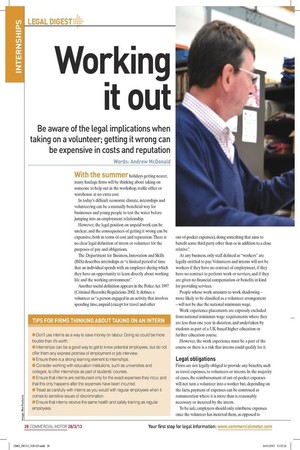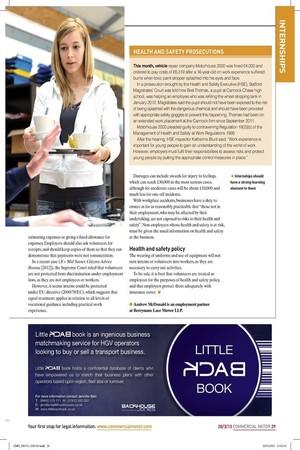Working it out Be aware of the legal implications when
Page 17

Page 18

If you've noticed an error in this article please click here to report it so we can fix it.
taking on a volunteer; getting it wrong can be expensive in costs and reputation Words: Andrew McDonald with the summer holidays getting nearer, many haulage firms will be thinking about taking on someone to help out in the workshop, traffic office or warehouse at no extra cost.
In today's difficult economic climate, internships and volunteering can be a mutually beneficial way for businesses and young people to test the water before jumping into an employment relationship.
However, the legal position on unpaid work can be unclear, and the consequences of getting it wrong can be expensive, both in terms of cost and reputation. There is no clear legal definition of intern or volunteer for the purposes of pay and obligations.
The Department for Business, Innovation and Skills (BIS) describes internships as "a limited period of time that an individual spends with an employer during which they have an opportunity to learn directly about working life and the working environment".
Another useful definition appears in the Police Act 1997 (Criminal Records) Regulations 2002. It defines a volunteer as "a person engaged in an activity that involves spending time, unpaid (except for travel and other out-of-pocket expenses), doing something that aims to benefit some third party other than or in addition to a close relative".
At any business, only staff defined as "workers" are legally entitled to pay. Volunteers and interns will not be workers if they have no contract of employment, if they have no contract to perform work or services, and if they are given no financial compensation or benefits in kind for providing services.
People whose work amounts to work shadowing — more likely to be classified as a volunteer arrangement — will not be due the national minimum wage.
Work experience placements are expressly excluded from national minimum wage requirements where they are less than one year in duration, and undertaken by students as part of a UK-based higher education or further education course.
However, the work experience must be a part of the course or there is a risk that interns could qualify for it.
Legal obligations Firms are not legally obliged to provide any benefits, such as travel expenses, to volunteers or interns. In the majority of cases, the reimbursement of out-of-pocket expenses will not turn a volunteer into a worker but, depending on the facts, payment of expenses can be construed as remuneration where it is more than is reasonably necessary or incurred by the intern.
To be safe, employers should only reimburse expenses once the volunteer has incurred them, as opposed to estimating expenses or giving a fixed allowance for expenses. Employers should also ask volunteers for receipts, and should keep copies of them so that they can demonstrate that payments were not remuneration.
In a recent case (X v Mid Sussex Citizens Advice Bureau [20121), the Supreme Court ruled that volunteers are not protected from discrimination under employment laws, as they are not employees or workers.
However, it seems interns could be protected under EU directive (2000/78/EC), which suggests that equal treatment applies in relation to all levels of vocational guidance including practical work experience. Damages can include awards for injury to feelings, 44 Internships should which can reach £30,000 in the most serious cases, have a strong learning although for moderate cases will be about £10,000 and element to them much less for one-off incidents.
With workplace accidents, businesses have a duty to ensure as far as reasonably practicable that "those not in their employment, who may be affected by their undertaking, are not exposed to risks to their health and safety". Non-employees whose health and safety is at risk, must be given the usual information on health and safety at the business.
Health and safety policy The wearing of uniforms and use of equipment will not turn interns or volunteers into workers, as they are necessary to carry out activities.
To be safe, it is best that volunteers are treated as employees for the purposes of health and safety policy, and that employers protect them adequately with insurance cover. • • Andrew McDonald is an employment partner at Berrymans Lace Mawer LLP. HEALTH AND SAFETY PROSECUTIONS This month, vehicle repair company Motorhouse 2000 was fined £4,000 and ordered to pay costs of £6,319 after a 16-year-old on work experience suffered burns when toxic paint stripper splashed into his eyes and face.
In a prosecution brought by the Health and Safety Executive (HSE), Stafford Magistrates' Court was told how Bret Thomas, a pupil at Cannock Chase high school, was helping an employee who was refilling the wheel stripping tank in January 2012. Magistrates said the pupil should not have been exposed to the risk of being splashed with the dangerous chemical and should have been provided with appropriate safety goggles to prevent this happening. Thomas had been on an extended work placement at the Cannock firm since September 2011.
Motorhouse 2000 pleaded guilty to contravening Regulation 19(2)(b) of the Management of Health and Safety at Work Regulations 1999.
After the hearing, HSE inspector Katherine Blunt said: "Work experience is important for young people to gain an understanding of the world of work. However, employers must fulfil their responsibilities to assess risks and protect young people by putting the appropriate control measures in place."
TIPS FOR FIRMS THINKING ABOUT TAKING ON AN INTERN • Don't use interns as a way to save money on labour. Doing so could be more trouble than it's worth.
• Internships can be a good way to get to know potential employees, but do not offer them any express promise of employment or job interview.
• Ensure there is a strong learning element to internships.
• Consider working with education institutions, such as universities and colleges, to offer internships as part of students' courses.
• Ensure that interns are reimbursed only for the exact expenses they incur, and that this only happens after the expenses have been incurred.
• Tread as carefully with interns as you would with regular employees when it comes to sensitive issues of discrimination.
• Ensure that interns receive the same health and safety training as regular employees.









































